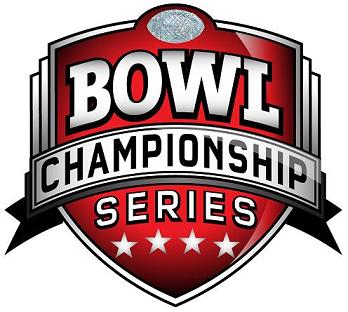
Another year, and another BCS controversy – Five teams are undefeated after the regular season and conference championships – only two get to play for the national title, Alabama and Texas. What about Cincinnati, Boise State and TCU? It’s their fault they are smaller and less hyped programs. We need a playoff! But anyway, in case you’re still surprised by the chaos and disappointment caused by the BCS each year, here’s how things have went wrong since it’s entered our lives –
1998 – Kansas State

Image: Source
The first run of the new BCS system didn’t see the title game being disputed, with Tennessee and Florida State going for it in Arizona, and the Vols winning the title. Kansas State were ranked third in the final BCS rankings, going 8-1 in division play, after losing to Texas A&M in the Big 12 title game. Still, a third place in the BCS rankings should be enough for a BCS bowl game, right? Wrong. Ohio State (4th) and Florida (8th) got at-large bids, to the Sugar and Orange Bowl, while the Wildcats got to play at the Alamo Bowl, losing to Purdue. Tulane were another team missing out on a BCS bid despite finishing the season 10th in the BCS rankings and undefeated. Strength of schedule was the proclaimed reason. This season gave birth to the “Kansas State Rule“.
1999 – Again, Kansas State
Not as bad as last time, but still, Bill Snyder and his team couldn’t get a BCS Bowl game. They finished 6th in the BCS rankings, but Michigan (8th) got an at-large bid to the Orange Bowl while Kansas State had to play in the Holiday Bowl against Washington.
2000 – One loss predicament
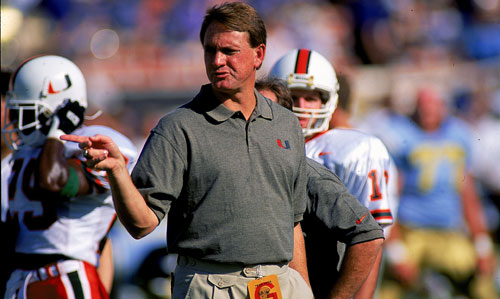
Image: Source
National Title Game – Oklahoma (12-0) against Florida State (12-1), #1 and #2 in the BCS. Got it right, no? Wrong. Miami (#2 in the human polls) finished the season with an 11-1 record and their only loss coming to another one loss team, Washington. Florida State’s only loss was against – Miami. Florida State played for the title and lost, Miami and Washington both won their BCS Bowl games and the BCS tweaked it’s system, adding a “quality of win” bonus to the formula.
2001 – Time of loss
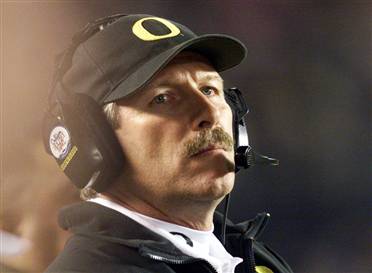
Image: Source
Nebraska didn’t play in the Big 12 championship game after their final regular season loss at Boulder to Colorado, who went on to win the Big 12 title. That didn’t stop Nebraska, #4 in the human polls, from going to the national championship game and getting routed by Miami. Oregon, ranked #2 in both human polls were placed at #4 by the BCS. The BCS didn’t account for time-of-loss, so one loss Nebraska left two-loss but Big 12 Champions Colorado and one loss #2 ranked Oregon to play in the Fiesta Bowl. Oregon won.
2002 – Rose Bowl problems
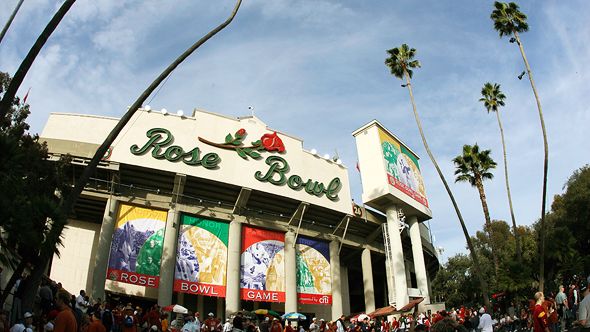
Image: Source
No problem with the title game that year, as Ohio State and Miami played for the national title after both finishing the season undefeated. The Buckeyes went on to win in a double overtime game. The Rose Bowl was where the problems occurred – The Rose Bowl usually hosts the Big Ten and Pac-10 champions, but this time Ohio State played for the national title, in the Fiesta Bowl. The other Bowls have a pecking order, with the Orange Bowl being next, the Rose Bowl after that and then the Sugar Bowl. Everyone wanted #5 USC, who would usually go to the Rose Bowl as Pac-10 champions. But they went to the Orange Bowl to face #3 Iowa in what was called a Rose Bowl East, while the original Rose Bowl fans saw Washington State play against Oklahoma, in the first non-sellout since 1944.
2003 – Split National Title (Yeah, the BCS Works)
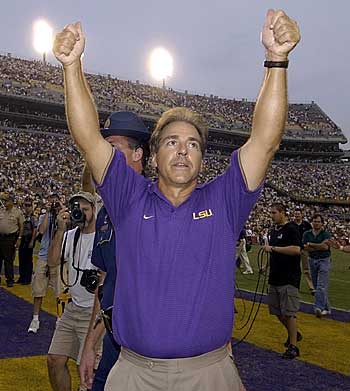
Image: Source
No team finished the season undefeated for the first time since 1996. Three one-loss teams were the subject of all the noise – LSU, Oklahoma and USC. LSU were ranked #2 in the human polls and had a better computer ranking then USC, while Oklahoma were the BCS #1 and USC were #1 in the human polls. What to do? BCS rules – Oklahoma and LSU played for the national title, with LSU winning 21-14. USC beat Michigan in the Rose Bowl, maintaining it’s #1 AP ranking. The college coaches involved in the voting were contractually obligated to vote for the BCS title game winner as #1, but the majority didn’t and the Trojans kept their #1 AP Ranking.
2004 – Five Undefeated Teams, Auburn Left Out
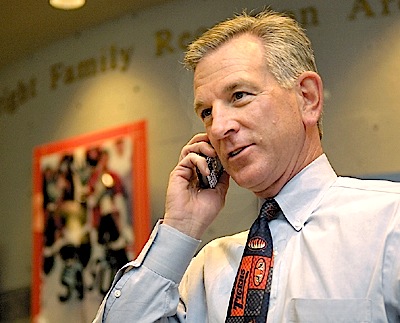
Image: Source
Very similar to this year – Five undefeated teams – USC, Oklahoma, Auburn, Utah and Boise State. USC and Oklahoma started the season as #1 and #2, while the other teams started outside the top 15. Meaning? For the BCS it meant putting USC against Oklahoma in the title game, with USC crushing the Sooners 55-19. Auburn went on to win against Virginia Tech in the Sugar Bowl, Utah beat Pitt in the Fiesta Bowl while Boise State lost in the Liberty Bowl. The season ended with three undefeated teams. The Rose Bowl was again in the middle of a BCS controversy, as Texas, helped by a lot of poll lobbying by coach Mack Brown, jumped California in the polls just before the Bowl bids were given out. Brown’s lobbying resulted in the AP ranking ending it’s association with the BCS system, replaced by the Harris poll. It also started the calls for votes to be made public.
2006 – One loss mayhem again
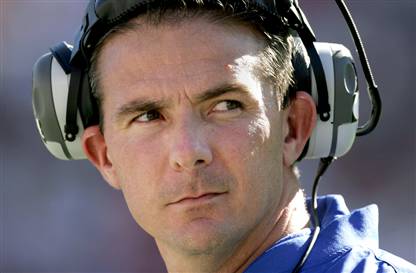
Image: Source
A quiet 2005 was quickly forgotten as undefeated Ohio State had four potential rivals for the title game – Louisville, who were counted out because of a weak schedule, Wisconsin, because they lost to Michigan who lost to Ohio State, Michigan, who just lost to the Buckeyes in a classic 42-39 game, and Florida, who were ranked behind Michigan in the polls. Florida beat Arkansas in the SEC title game, and jumped over Michigan, getting the #2 spot, while Michigan didn’t play that week. Eventually, Florida beat Ohio State and Michigan lost to USC in the Rose Bowl, but this was another example of the growing demand and need for a playoff system. Boise State also finished the season undefeated, but had to settle for the Fiesta Bowl, where they stunned Oklahoma 43-42 in overtime.
2007 – Two Loss Mayhem

Image: Source
One team finished the regular season undefeated – Hawaii. The Warriors, like Boise State, didn’t get an invitation to the national title game – schedule was too weak. All the national title candidates were two loss teams eventually – LSU (two triple overtime defeats). Missouri, at one time ranked #1 in the nation, lost in the Big 12 championship game to Oklahoma. West Virginia lost in the backyard brawl to Pittsburgh. LSU jumped from #7 to #2 after beating Tennessee in the SEC championship game, leaping over Georgia and Virginia Tech, while Ohio State, by remaining idle for the final two weeks of the season, made it to #1. Confused? Many people were, and still are. Also who Kansas (only one loss, too weak schedule) got an at-large bid to a BCS Bowl game despite being ranked below Missouri and losing to Missouri in the regular season. Confused? You get the point.
2008 – Big 12 Mess
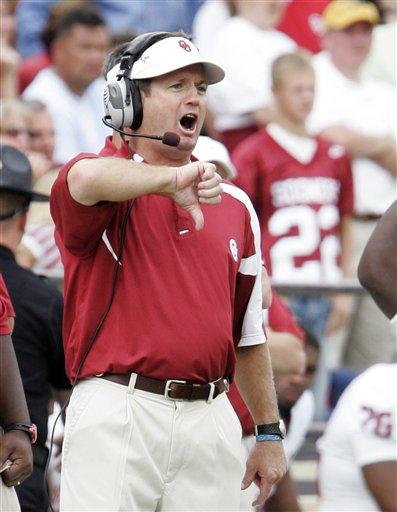
Image: Source
The Big 12 south had three teams with one loss, before the Conference championship games. Oklahoma, with their only loss coming against Texas, Texas, with their only loss coming against Texas Tech, and Texas Tech, with their only loss coming against – Oklahoma. The Big 12 used the BCS rankings, based on polls along with the computers, to determine the Big 12 South winner. Again, strong lobbying for Bob Stoops (Oklahoma’s coach) helped the Sooners get the first spot, and they went on to crush Missouri in the Big 12 title game, heading into the National Title Game. Meanwhile, Alabama were also undefeated going into their SEC Championship game against Florida. Boise State, Utah and Ball State were also undefeated, but an Alabama loss wouldn’t help them get a national title bid, due to their weaker schedule’s. Alabama lost to Florida who went on to beat Oklahoma and win the national title. Utah beat Alabama in their bowl game, finishing the season as the only undefeated team, while Boise State and Ball State lost their Bowl games.
9 responses to “The BCS – Getting it Wrong Since 1998”
[…] This post was mentioned on Twitter by Talsiach, Ehud Riven. Ehud Riven said: Reviewing BCS blunders since 1998 http://sportige.com/bcs-controversies/ […]
Social comments and analytics for this post…
This post was mentioned on Twitter by Gerakis100: Reviewing BCS blunders since 1998
http://sportige.com/bcs-controversies/…
Really nice to have a look back as to why the system fails. It really derails any attempt by the BCS to justify why it is better than a playoff and anything more than a number$ game.
As a Miami alum, 2000 was extremely painful since we were ranked ahead of FSU and beat them and they laid an egg against OU in the title game and scored only 2 points. Butch Davis left after that year but hey the New York Times gave us their national title!
2001 was of course a good year but we never should have played Nebraska, they were not on our level, but then again that was one of the best college teams ever.
“The Buckeyes went on to win in a double overtime game. ”
No Cane fan would ever agree that this is what happened, open to interpretation in my opinion.
That pass interference call was pretty bogus…
Lot of bad calls in that game, I actually drove from Miami to Arizona to see that game. At the time I thought that the call would fill me with burning hatred forever but as time has passed it has become scar tissue and it does not bother me as much as it used to. In fact, the 2000 screw-job kind of bothers me more.
Miami and Ohio State have a home and home over the next two years, first game in Columbus Sep. 11, 2010, should be awesome.
Yeah, Miami seem to have recovered a bit of their swagger this season… A win against Wisconsin in the end of the month will really set high expectations for 2010
[…] The BCS – Getting it wrong in College Football si… […]
[…] The BCS – getting it Wrong sinc… […]
naturally like your web site however you have to take a look at the spelling on several of your posts. Many of them are rife with spelling problems and I to find it very bothersome to tell the truth on the other hand I will surely come again again.